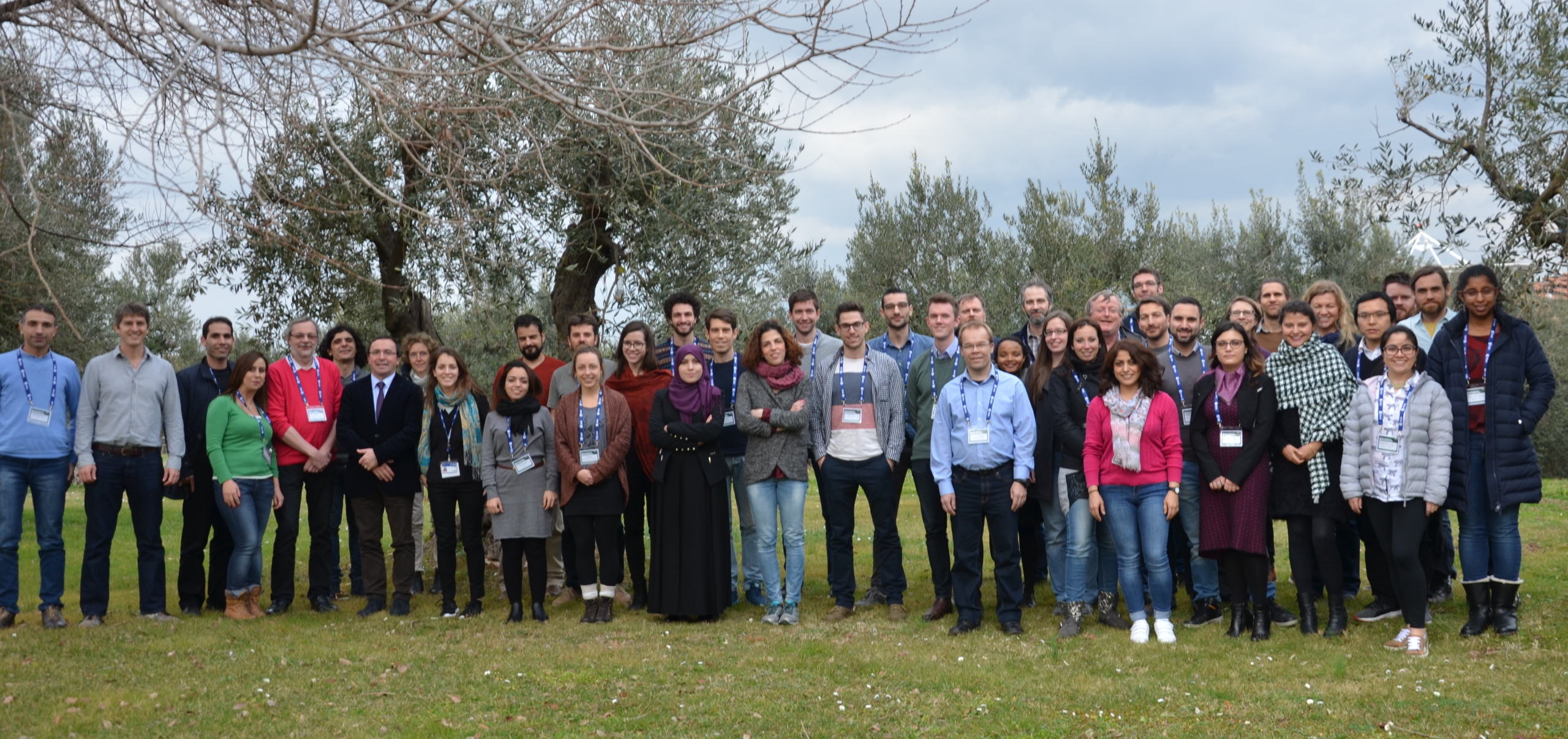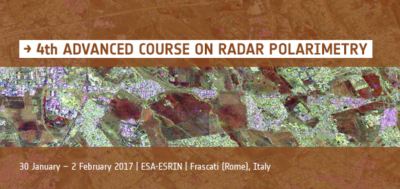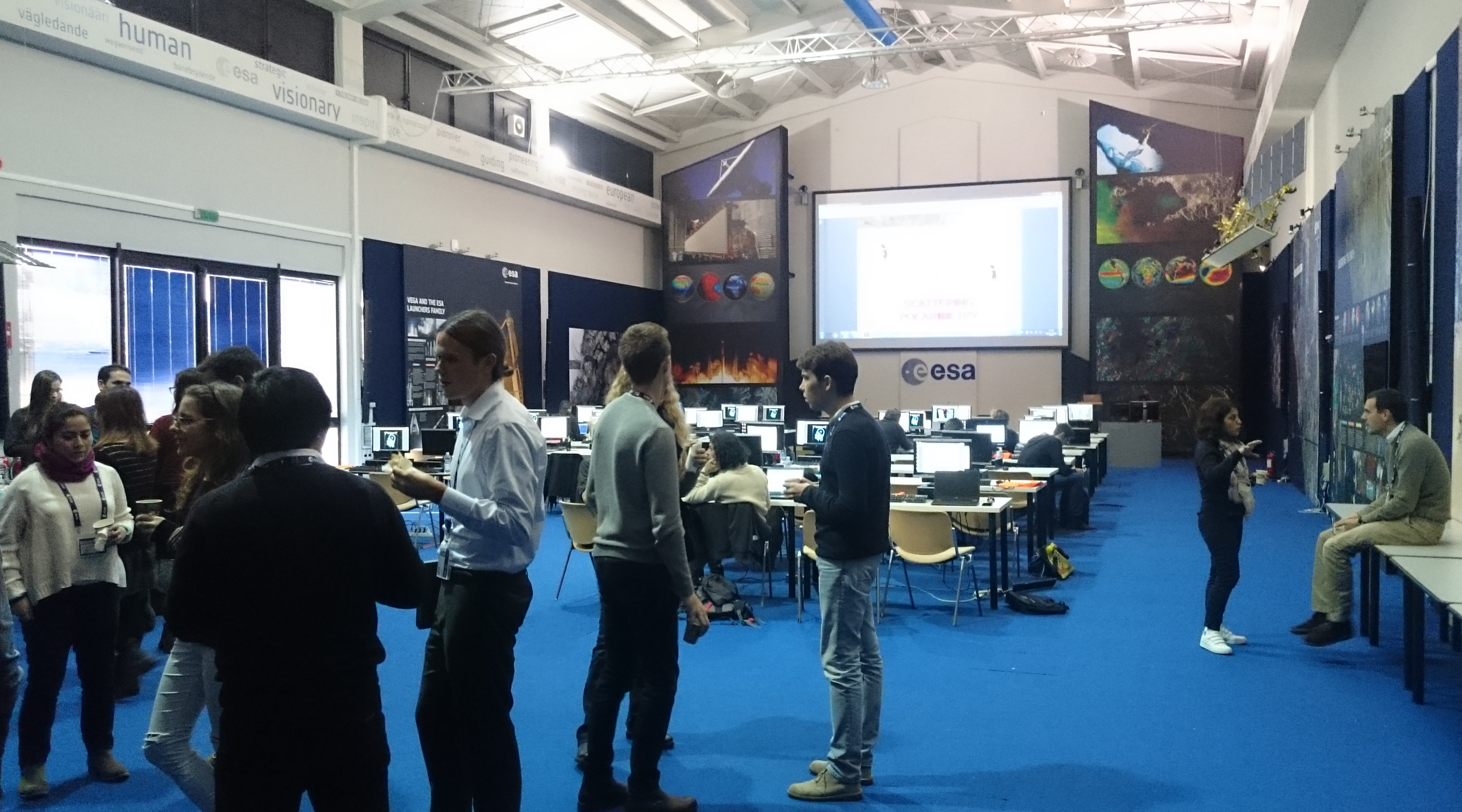Using European Space Agency expertise to grow better crops
22/02/2017

When you hear the words European Space Agency (ESA), ambitious missions to mars or spectacular crash-landings on comets may come to mind. What is less likely to occur is agriculture and improving crop yields. But earlier this month (6th-9th February 2017), I attended the 4th ESA Advanced Course on Radar Polarimetry taking place in ESA-ESRIN, Frascati (Italy) for those very reasons.
 This free course was an excellent opportunity to meet experts in the field of Polarimetric Synthetic Aperture Radar (PolSAR) and to learn more about the potentials and limitations of this technique. PoISAR is a measurement system based on Radar (an antenna on-board a satellite/plane emits an electromagnetic wave down the Earth and records the echo from the land surface) able to record signals at different polarisations…think of it as a camera recording different colours. These polarisations are sensitive to different characteristics (structure, water content, etc.) of the imaged scene.
This free course was an excellent opportunity to meet experts in the field of Polarimetric Synthetic Aperture Radar (PolSAR) and to learn more about the potentials and limitations of this technique. PoISAR is a measurement system based on Radar (an antenna on-board a satellite/plane emits an electromagnetic wave down the Earth and records the echo from the land surface) able to record signals at different polarisations…think of it as a camera recording different colours. These polarisations are sensitive to different characteristics (structure, water content, etc.) of the imaged scene.
As a research fellow in Remote Sensing within the Cranfield Soil and Agrifood Institute, I am often involved in research projects looking at detecting crop growth stages, or estimating yield. I was looking forward to learning more about PolSAR, which has many applications in Remote Sensing of vegetation, from measuring tree heights or biomass in the Amazon and the Boreal forests, to detecting objects concealed under vegetation.
Course review
Well, the course went beyond my expectations. It covered the principles of PolSAR, with a focus on advanced measurement techniques like polarimetric interferometry (Pol-InSAR) and polarimetric tomography (Pol-TomoSAR). The morning lectures were very informative, with engaging experts always happy to discuss the numerous questions of the audience (mainly PhD students and Post-Docs). The afternoon practical sessions were well thought out and very useful as teaching PolSAR often relies on a series of mathematical concepts. All this was punctuated by presentations on the latest Earth Observation missions and their scientific results. Beyond the great learning experience, the course was also a good platform for networking with other scientists in universities and in companies involved in SAR Remote Sensing.

The Colosseum, Rome
Frascati is only 30 minutes away from Rome, meaning I had time to make an express visit to the main historical sights (the Colosseum, Pantheon, Trevi Fountain, Vatican), and a typical Italian ice cream of course!
But back to work! The ESA runs various free events within the context of the Scientific Exploitation of Operational Missions program (SEOM). SEOM’s aims include stimulating research, training scientists, and promoting data use and results. In practice, this is done by regularly organising free workshops, short courses, and summer schools on various remote sensing topics covering land, ocean, atmosphere, and cryosphere. And if you miss an event, all the materials are usually made freely available on the ESA-SEOM website. I would definitely recommend this type of courses to any scientists interested in Earth Observation, from MSc students to lecturers.

The lecture room at ESA-ESRIN
Categories & Tags:
Leave a comment on this post:
You might also like…
Keren Tuv: My Cranfield experience studying Renewable Energy
Hello, my name is Keren, I am from London, UK, and I am studying Renewable Energy MSc. My journey to discovering Cranfield University began when I first decided to return to academia to pursue ...
3D Metal Manufacturing in space: A look into the future
David Rico Sierra, Research Fellow in Additive Manufacturing, was recently involved in an exciting project to manufacture parts using 3D printers in space. Here he reflects on his time working with Airbus in Toulouse… ...
A Legacy of Courage: From India to Britain, Three Generations Find Their Home
My story begins with my grandfather, who plucked up the courage to travel aboard at the age of 22 and start a new life in the UK. I don’t think he would have thought that ...
Cranfield to JLR: mastering mechatronics for a dream career
My name is Jerin Tom, and in 2023 I graduated from Cranfield with an MSc in Automotive Mechatronics. Originally from India, I've always been fascinated by the world of automobiles. Why Cranfield and the ...
Bringing the vision of advanced air mobility closer to reality
Experts at Cranfield University led by Professor Antonios Tsourdos, Head of the Autonomous and Cyber-Physical Systems Centre, are part of the Air Mobility Ecosystem Consortium (AMEC), which aims to demonstrate the commercial and operational ...
Using grey literature in your research: A short guide
As you research and write your thesis, you might come across, or be looking for, ‘grey literature’. This is quite simply material that is either unpublished, or published but not in a commercial form. Types ...






